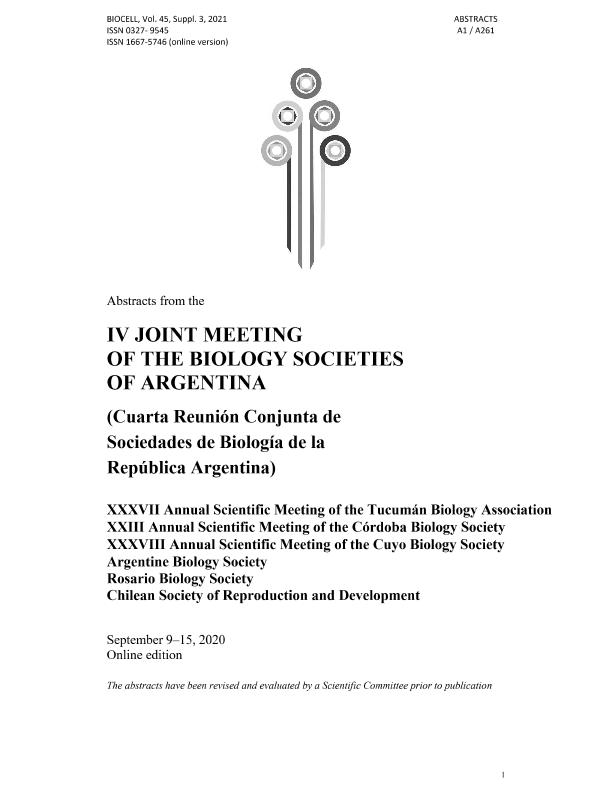Evento
Can caloric restriction improve cognition in aging rats?
Altamirano, Fernando Gabriel; Ponce, Ivana Tamara; Castro Pascual, Ivanna Carla; Ferramola, Mariana Lucila; Delgado, Silvia Marcela; Anzulovich, Ana Cecilia; Lacoste, Maria Gabriela

Tipo del evento:
Congreso
Nombre del evento:
IV Reunión Conjunta de Sociedades de Biología de la República Argentina
Fecha del evento:
09/09/2020
Institución Organizadora:
Sociedades de Biología de la Argentina;
Título de la revista:
Biocell
Editorial:
Sociedades de Biología de la Argentina
ISSN:
1667-5746
Idioma:
Inglés
Clasificación temática:
Resumen
Can caloric restriction improve cognition in aging rats?Altamirano FG1, Ponce IT2, Castro Pascual IC1, Ferramola M2, Delgado SM2, Anzulovich AC1,2, Lacoste MG1,21Laboratorio de Cronobiología, IMIBIO, Universidad Nacional de San Luis, CONICET; 2 Facultad de Química, Bioquímica y Farmacia, Universidad Nacional de San Luis. San Luis, Argentina. E-mail: fergabalt@gmail.comCaloric restriction (CR) consists of reducing daily calorie intake without causing malnutrition. CR is the most effective non-pharmacological intervention in increasing longevity and reducing the effects of normal and pathological aging. Memory loss and cognitive impairment are one of the main features of aging and the effect of CR on these cognitive functions are still under study. Previous behavioral and molecular studies of our group showed that old animals had a low cognitive performance and loss of temporal expression of BDNF and TrkB, two proteins strongly linked to memory and learning processes, in hippocampus. Furthermore, we also demonstrate that CR treatment in old animals restored these temporal patterns of BDNF and TrkB in the hippocampus. Due to these antecedents, in the present work our objective was to evaluate if this restoration we previously observed at a molecular level is related to improvements in the cognitive performance of older animals under CR. Male Holtzman rats were separated into three experimental groups: young ad libitum (3-month-old, Y-AL group, n=10), older ad libitum (22-month-old, O-AL group, n=10), and older subjected to a 40% CR treatment during the last 3 months prior to the 22 months of age (O-CR group, n=5). Cognitive performance was assessed using the Barnes Maze (BM) test for spatial learning and memory and the New Object Recognition (NOR) test for contextual learning. In the BM test, we observed that the O-CR rats presented a shorter distance traveled on the platform, similar to Y-AL group. We did not find significant differences between O-CR and O-AL animals in the rest of the parameters analyzed with BM test (exploratory frequency of the target region, total exploratory activity, numbers of errors in reaching around the target hole, escape box latencies, percentage of exploration of the meta holes). In the case of NOR test, we also did not find significant differences between old animals and those subjected to CR. To date, the studies carried out on the effects of CR on cognitive functions are inconclusive and depend on the protocol used. The effects of CR depend on its intensity, the period of life in which the treatment begins and its duration. Our studies are preliminary, with a first group of animals in CR (n = 5), so increasing the number of animals studied could provide more conclusive data. CR could be a non-pharmacological alternative for maintaining mental and cognitive health during aging.
Palabras clave:
AGING
,
CALORIC RESTRICTION
,
MEMORY
,
LEARNIG
Archivos asociados
Licencia
Identificadores
Colecciones
Eventos(IMIBIO-SL)
Eventos de INST. MULTIDICIPLINARIO DE INV. BIO. DE SAN LUIS
Eventos de INST. MULTIDICIPLINARIO DE INV. BIO. DE SAN LUIS
Citación
Can caloric restriction improve cognition in aging rats?; IV Reunión Conjunta de Sociedades de Biología de la República Argentina; Virtual; Argentina; 2020; 104-105
Compartir



